Welcome User
Relevance
(19 doctors)
Dr Sumanth R
General Physician
2 Years • MBBS
Bengaluru
PRESTIGE SHANTHINIKETAN - SOCIETY CLINIC, Bengaluru

Dr. E Prabhakar Sastry
General Physician/ Internal Medicine Specialist
40 Years • MD(Internal Medicine)
Manikonda Jagir
Apollo Clinic, Manikonda, Manikonda Jagir
(150+ Patients)
Dr. Preeti Kathail
General Physician/ Internal Medicine Specialist
17 Years • MBBS, PGDHHM
Bangalore
Apollo Clinic Bellandur, Bangalore
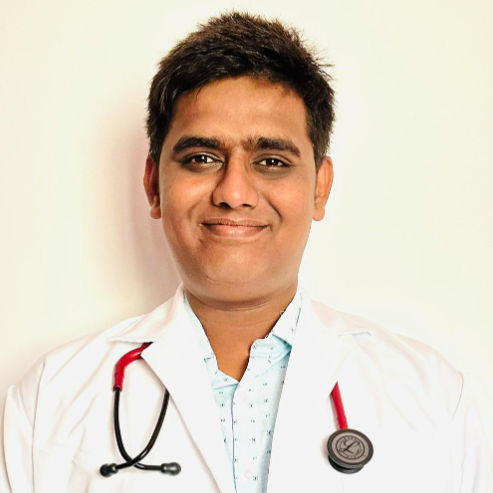
Dr. Sushith C
General Physician
2 Years • MBBS
Bengaluru
PRESTIGE SHANTHINIKETAN - SOCIETY CLINIC, Bengaluru

Dr. Pavan Kumar S K
Urologist
11 Years • MBBS, MS , Mch( Urology) DNB (Urology)
Bengaluru
Apollo Clinic, JP nagar, Bengaluru
Dr. E Nikhil
Internal Medicine Specialist Diabetologist
4 Years • MBBS,MD(General Medicine)
Manikonda Jagir
Apollo Clinic, Manikonda, Manikonda Jagir

Dr. Anupriya C
General Physician/ Internal Medicine Specialist
5 Years • MBBS, MD, General Medicine
Bengaluru
Apollo Clinic, JP nagar, Bengaluru
Dr. L Sanjay
Internal Medicine Specialist Diabetologist
15 Years • MBBS,MD(General Medicine)
Manikonda Jagir
Apollo Clinic, Manikonda, Manikonda Jagir

Dr. Kathirvel. M
Medical Geneticist
3 Years • MBBS, MD Pediatrics (JIPMER), DM Medical Genetics (AIIMS,New Delhi)
Chennai
Apollo Hospitals Greams Road, Chennai
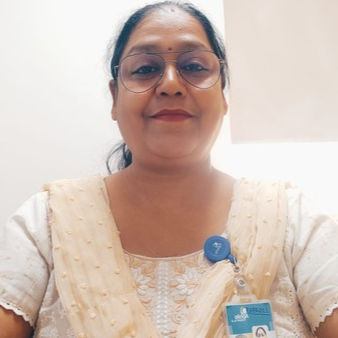
Dr. Saswati Mukhopadhyay
Medical Geneticist
10 Years • MBBS, DNB (G&O), DNB (Medical Genetics)
Kolkata
Apollo Multispeciality Hospitals , Kolkata, Kolkata
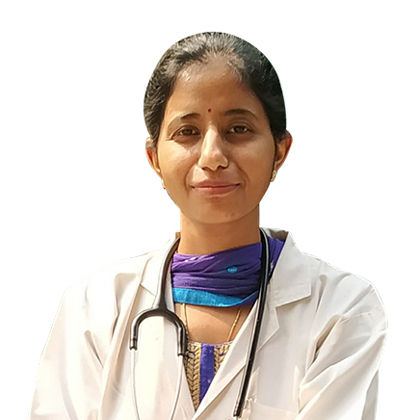
Dr. Ambika Gupta
Medical Geneticist
12 Years • MBBS, MD Pediatrics, DM Medical Genetics (AIIMS, New Delhi)
Ahmedabad
Apollo Hospitals Gandhinagar, Ahmedabad
(25+ Patients)
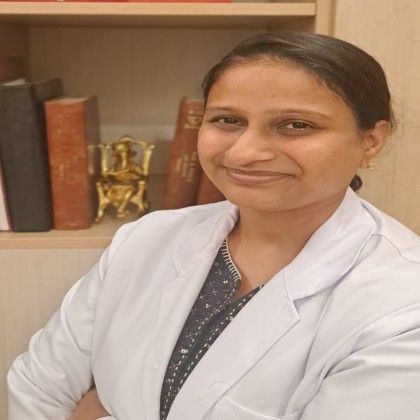
Dr. Priya Ranganath
Medical Geneticist
5 Years • DNB Super specialty – Medical Genetics (NIMS, Hyderabad) MS OBG [Mysore Medical College and Research institute] MBBS – (Bangalore Medical college and Research institute)
Bengaluru
Apollo Hospitals Bannerghatta Road, Bengaluru
(25+ Patients)
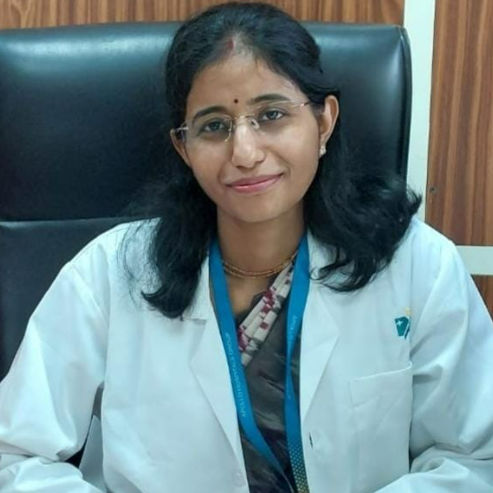
Dr Ambika Gupta
Medical Geneticist
11 Years • DM-Medical Genetics (All India Institute of Medical Sciences, New Delhi) Certification in Cancer Genomics and Precision Oncology, Harvard Medical School, Boston, USA. MD-Pediatrics (King George Medical University, Lucknow) MBBS (Govt. Medical College, MS University of Baroda, Vadodara)
New Delhi
Apollo Cradle Motinagar, New Delhi

Dr Alec Errol Correa
Medical Geneticist
13 Years • MBBS,MD,DM
Chennai
Apollo Proton Cancer Center, Chennai
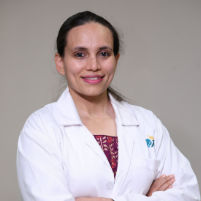
Dr Kshitija Patil
Medical Geneticist
7 Years • M.B.B.S: Medicine,MD: Pediatrics, Fellowship : Clinical Genetics,DM: Medical Genetics.
Mumbai
Apollo Hospitals CBD Belapur, Mumbai
Medical Genetics
Booking an appointment with a top geneticist is now easier than ever with Apollo 24|7. Our user-friendly platform allows you to schedule an online geneticist consultation or a physical visit at a trusted hospital or clinic near you. With a wide range of convenient appointment slots and access to the best geneticists in the country, Apollo 24|7 ensures that you receive the highest quality care for all your genetic health concerns. Whether you need a DNA specialist, a doctor for hereditary brain issues, or a prenatal genetic testing doctor, our experienced team of geneticists is here to help. Book your appointment today and take the first step towards better health.
What is Medical Genetics?
Medical Genetics is a branch of medicine that focuses on the diagnosis, management, and counselling of patients with hereditary disorders. This speciality deals with a wide range of conditions, including birth defects, intellectual disabilities, autism, mitochondrial disorders, skeletal dysplasia, connective tissue disorders, cancer genetics, prenatal diagnosis, and metabolic disorders such as galactosemia and phenylketonuria.
Medical Genetics plays a crucial role in healthcare by enabling early diagnosis and management of genetic disorders, providing genetic counselling to families at risk, and contributing to the development of personalised medicine through pharmacogenetics.
Who is a Geneticist?
A geneticist is a physician who specialises in the diagnosis, management, and counselling of patients with genetic disorders. In the Indian subcontinent, becoming a geneticist involves earning an MBBS degree, completing a postgraduate residency programme in a related field, and pursuing specialised training in Medical Genetics through a fellowship or dedicated residency programme.
Geneticists specialise in diagnosing and managing genetic disorders across all age groups, from prenatal care to adult genetics. They play a vital role in preventive healthcare by identifying genetic risks, offering preimplantation genetic diagnosis, providing genetic counselling, and contributing to the early detection and prevention of genetic diseases.
What Does a Geneticist Do?
Medical geneticists specialise in diagnosing, treating, and managing genetic disorders. As a DNA specialist, a geneticist helps patients understand their genetic makeup and its potential impact on their health. They also act as a doctor for hereditary brain issues, providing expert care for individuals with neurological conditions caused by genetic factors.
Some of the key responsibilities of a geneticist include:
Diagnosing and managing a wide range of genetic disorders, from single-gene conditions to chromosomal abnormalities
Conducting prenatal genetic testing to identify potential genetic issues in unborn babies
Providing genetic counselling to families affected by or at risk of hereditary diseases
Offering online geneticist consultations to make expert care more accessible
Staying up-to-date with the latest research and advancements in the field of Medical Genetics.
What are the Other Sub-specialities of Medical Genetics?
Medical Genetics encompasses several sub-specialities that focus on specific aspects of genetic health. These sub-specialities include:
Genetic Counselling: This sub-speciality involves providing information, support, and guidance to individuals and families affected by or at risk of genetic disorders.
Genetic Testing and Screening: This area focuses on the use of various tests to identify genetic mutations, chromosomal abnormalities, and other genetic factors that may contribute to health issues.
Diagnosis of Inherited Disorders: Geneticists specialising in this area work to identify and diagnose genetic conditions that are passed down from parents to children.
Prenatal Genetic Screening: This sub-speciality involves testing for genetic disorders during pregnancy to identify potential health issues in the unborn child.
Carrier Screening: This area focuses on identifying individuals who carry genetic mutations that could be passed on to their children, even if they themselves do not have the disorder.
Rare Genetic Disease Diagnosis: Geneticists in this sub-speciality work to identify and diagnose rare genetic conditions that may be difficult to detect.
Genetic Syndromes: This area involves the diagnosis and management of specific genetic syndromes, such as Down Syndrome and Marfan Syndrome.
Chromosomal Abnormalities: Geneticists specialising in this area diagnose and manage conditions caused by abnormalities in the number or structure of chromosomes, such as Klinefelter Syndrome and Turner Syndrome.
Cancer Genetics and Hereditary Cancer Syndromes: This sub-speciality focuses on identifying and managing genetic factors that contribute to the development of various types of cancer.
Molecular Diagnostics: This area involves the use of molecular techniques to diagnose genetic disorders and guide treatment decisions.
Pharmacogenomics: Also known as personalised medicine, this sub-speciality uses genetic information to predict an individual's response to specific medications and tailor treatment accordingly.
Epigenetics: This area studies how environmental factors and lifestyle choices can influence gene expression without changing the underlying DNA sequence.
Gene Therapy and Clinical Trials: Geneticists in this sub-speciality work to develop and test new treatments that target genetic disorders at the molecular level.
Developmental Disorders: This area focuses on the diagnosis and management of genetic conditions that affect development, such as Autism Spectrum Disorders.
Metabolic Disorders and Inborn Errors of Metabolism: This sub-speciality involves the diagnosis and treatment of genetic disorders that affect the body's ability to process certain substances, such as galactosemia and phenylketonuria.
What are the Medical Genetics Examinations or Tests Performed by the Geneticist?
Geneticists perform a variety of tests and procedures to diagnose and manage genetic disorders. Some of the most common examinations and tests include:
DNA Testing: Molecular genetic tests are used to identify specific DNA mutations that underlie single-gene disorders, such as cystic fibrosis, Huntington’s disease, and hereditary breast cancer (BRCA1/2).
Chromosomal Analysis: These studies are conducted to detect chromosomal abnormalities, such as Down syndrome, Turner syndrome, and chromosomal rearrangements.
Biochemical Genetics Tests: These tests help diagnose metabolic disorders by analysing enzymatic deficiencies and biochemical pathways involved in the metabolism of carbohydrates, amino acids, and lipids. Examples include tests for galactosemia, glycogen storage disease, and phenylketonuria.
Prenatal Testing: Non-invasive prenatal testing (NIPT) and invasive procedures like amniocentesis and chorionic villus sampling (CVS) are used to diagnose genetic disorders in the fetus.
Preimplantation Genetic Diagnosis (PGD): This test combines genetic diagnosis with in vitro fertilisation to prevent the transmission of specific genetic diseases.
Carrier Screening: These tests are used to identify individuals who are carriers of genetic mutations for disorders such as cystic fibrosis, spinal muscular atrophy, and thalassemia.
These examinations and tests are essential for the accurate diagnosis and management of genetic disorders, allowing geneticists to provide the best possible care for their patients.
What are the Common Conditions & Diseases that Geneticists Treat?
Here are the common conditions and diseases that genetics treat:
Cystic Fibrosis: A genetic disorder affecting the lungs and digestive system, causing thick mucus buildup and recurrent infections.
Sickle Cell Disease: An inherited blood disorder causing abnormally shaped red blood cells, leading to pain crises and organ damage.
Huntington's Disease: A progressive hereditary brain issue causing uncontrolled movements, cognitive decline, and psychiatric problems.
Phenylketonuria (PKU): An inherited metabolic disorder requiring a special diet to prevent intellectual disability and other complications.
Down Syndrome: A chromosomal disorder causing intellectual disability and distinctive physical features.
Turner Syndrome: A condition affecting females, caused by a missing or partially missing X chromosome, leading to short stature and infertility.
Familial Cancers: Certain cancers, such as breast, ovarian, and colorectal cancers, can have a strong genetic component.
Neurofibromatosis: A group of genetic disorders causing tumours to grow on nerve tissue throughout the body.
Duchenne Muscular Dystrophy: A progressive muscle-wasting disorder primarily affecting boys, caused by a mutation in the dystrophin gene.
Haemophilia: An inherited bleeding disorder caused by a lack of blood clotting factors.
Thalassemia: A group of inherited blood disorders characterised by abnormal haemoglobin production.
Marfan Syndrome: A connective tissue disorder affecting the heart, blood vessels, eyes, and skeletal system.
Fragile X Syndrome: The most common inherited cause of intellectual disability, caused by a mutation in the FMR1 gene.
Spinal Muscular Atrophy (SMA): A group of inherited disorders causing muscle weakness and atrophy.
Tay-Sachs Disease: A rare, inherited disorder causing progressive damage to the nervous system.
Reasons to See a Geneticist
Consulting a geneticist near me is crucial for individuals with a family history of genetic disorders, those planning a pregnancy, or those presenting with symptoms suggestive of a genetic condition. A genetic disorder specialist can provide valuable insights, guidance, and management strategies to improve health outcomes.
Family History of Genetic Disorders: If you have a family history of conditions like cystic fibrosis, Huntington's disease, or certain cancers, a geneticist can assess your risk and provide appropriate counselling.
Pregnancy Planning and Prenatal Testing: Couples planning a pregnancy or those who are already pregnant may benefit from seeing a prenatal genetic testing doctor to discuss potential risks and undergo tests like amniocentesis or chorionic villus sampling (CVS).
Unusual Physical Features or Developmental Delays: Children or adults with unusual physical characteristics, developmental delays, or intellectual disabilities should consult a geneticist for a comprehensive evaluation.
Cancer Screening and Prevention: Individuals with a family history of certain cancers, such as those related to BRCA mutations, may require more frequent screening or preventive measures, which a geneticist can help coordinate.
Recurrent Miscarriages or Infertility: Couples experiencing recurrent pregnancy loss or infertility may have an underlying genetic cause, which a geneticist can help identify and address.
Symptoms Suggestive of Genetic Disorders: If you or a loved one experience symptoms that could indicate a genetic condition, such as muscle weakness, vision loss, or easy bruising, a geneticist can provide an accurate diagnosis and management plan.
Early diagnosis and preventive care, guided by a hereditary disease specialist, can significantly improve the quality of life for individuals with genetic conditions by enabling personalised treatment plans, preventive measures, and informed family planning decisions.
What Types of Procedures do Geneticists Perform?
Medical geneticists specialise in a variety of procedures to diagnose, treat, and manage inherited disorders and genetic abnormalities. Their expertise is often crucial in providing accurate diagnoses and effective interventions. These procedures fall broadly into two categories: therapies and surgeries.
Top Therapies in Medical Genetics
Genetic Testing: Analyses DNA to identify mutations associated with hereditary conditions, helping patients and families understand risks and available treatments.
Gene Therapy: Modifies or replaces faulty genes to treat or prevent genetic diseases, offering hope for previously untreatable conditions.
Carrier Screening: Identifies whether individuals are carriers of specific genetic conditions, particularly useful for family planning.
Prenatal Screening: Evaluates genetic risks in unborn children, enabling early intervention and informed decisions for expecting parents.
Pharmacogenomics: Personalises medication plans by considering the patient’s genetic makeup to maximise treatment efficacy and reduce side effects.
Newborn Screening: Detects genetic and metabolic disorders in infants, allowing prompt treatment and improved outcomes.
Mitochondrial Replacement Therapy: Addresses defective mitochondrial DNA to prevent transmission of associated disorders.
Preimplantation Genetic Diagnosis (PGD): Screens embryos created through IVF for genetic abnormalities before implantation.
Top Surgeries in Medical Genetics
Biopsy for Genetic Analysis: Involves obtaining tissue samples to investigate genetic alterations, aiding precise diagnoses.
Exome Sequencing Surgery: Removes specific DNA fragments for in-depth examination of coding regions linked to diseases.
Craniofacial Reconstruction: Corrects birth defects such as cleft palate caused by genetic conditions.
Surgical Treatment of Tumours: Targets tumours resulting from inherited cancer syndromes.
Bone Marrow Transplantation: Treats blood disorders like sickle cell anaemia and leukaemia, often related to genetic mutations.
Cardiac Surgery for Genetic Syndromes: Repairs heart defects in conditions like Marfan syndrome.
Facial Reconstruction Surgery: Addresses craniofacial deformities associated with genetic disorders.
Given the complexity of these procedures, some may require collaboration with other specialists. For instance, when surgeries intersect with intensive care, the critical care specialist fee can be an essential consideration, particularly in cases of gene-related tumours or congenital abnormalities requiring surgical intervention.
Why Choose an Apollo 24|7 Geneticist?
Apollo 24|7 geneticists are highly qualified and experienced professionals dedicated to providing the best possible care for patients with genetic conditions. Our team of DNA specialists and hereditary disease specialists offers personalised care, advanced treatment options, and seamless access to consultations, both online and in-clinic.
With Apollo 24|7, you can easily book geneticist appointments, access online geneticist consultation, and read geneticist reviews to make informed decisions about your healthcare. Our geneticists work closely with other specialists, such as critical care specialists, to ensure comprehensive care for all your medical needs.
What to Expect When Visiting a Geneticist?
During your visit to a geneticist, you can expect a thorough evaluation and discussion of your personal and family medical history. The geneticist will:
Review your medical records and any previous genetic test results.
Perform a physical examination to identify any characteristic features of genetic disorders.
Discuss the potential benefits, risks, and limitations of genetic testing.
Order appropriate genetic tests, such as blood tests, cheek swabs, or prenatal tests like amniocentesis or CVS.
Interpret the results of genetic tests and explain their implications for your health and family.
Develop a personalised management plan, which may include preventive measures, treatment options, and referrals to other specialists.
Provide genetic counselling to help you and your family understand the emotional, psychological, and social aspects of genetic conditions.
How Can I Get an Appointment With a Geneticist?
Booking an appointment with a geneticist at Apollo 24|7 is a simple and convenient process:
Online Appointment: Visit the Apollo 24|7 website and navigate to the "Book Appointment" section. Select "Geneticist" from the list of specialities, choose your preferred doctor, and select a suitable date and time for your consultation.
Apollo 24|7 App: Download the Apollo 24|7 app on your smartphone, log in or create an account, and navigate to the "Book Appointment" section. Follow the same steps as mentioned above to schedule your geneticist consultation.
Referral from Another Doctor: If another healthcare provider has referred you to a geneticist, you can contact Apollo 24|7 directly to schedule an appointment with the recommended specialist.
Call or Visit: You can also book an appointment by calling the Apollo 24|7 helpline or visiting one of our clinics in person. Our friendly staff will assist you in scheduling a consultation with a geneticist at your convenience.
FAQs
What is the role of a medical geneticist?
A medical geneticist diagnoses and manages genetic disorders, interprets genetic tests, and advises on hereditary conditions. They collaborate with healthcare teams to provide personalised treatment plans and genetic counselling to patients and families, improving outcomes and understanding of genetic health risks.
What is medical genetics?
Medical genetics is a branch of medicine that focuses on diagnosing, treating, and preventing genetic disorders. It combines clinical medicine with advances in genetics and genomics to understand and manage hereditary conditions.
What does a DNA specialist do?
A DNA specialist is a healthcare professional trained to diagnose and manage genetic disorders. They evaluate medical and family histories, perform physical exams, and interpret genetic test results. They also advise on genetic testing, identify pre-symptomatic individuals in families, and recommend treatment and management strategies for hereditary conditions.
How can I find a doctor for hereditary brain issues?
To find a doctor for hereditary brain issues, you can search for a medical geneticist or a neurologist who specialises in genetic disorders. You can consult your family physician for a referral or search online directories for geneticists near me. Look for a hereditary disease specialist with experience in diagnosing and managing genetic brain disorders.
Is genetics a doctor?
Genetics itself isn’t a doctor but a scientific field. Medical geneticists, however, are doctors who specialise in diagnosing, treating, and counselling patients on genetic disorders, bridging medicine and genetics to address hereditary conditions effectively.
What speciality is medical genetics?
Medical genetics is a healthcare speciality focused on genetic disorders. It combines clinical medicine, molecular biology, and genetic counselling to diagnose, manage, and treat hereditary conditions, offering insights into patients' health and family risks
What is genetic testing, and why is it important?
Genetic testing involves analysing an individual's DNA to identify changes or mutations that may cause genetic disorders. It is important because it helps understand the genetic basis of a condition, identify potential pre-symptomatic individuals in a family, and guide treatment and management decisions. Genetic testing can also help differentiate between similar conditions with overlapping symptoms.
What is the difference between genotype and phenotype?
The genotype refers to an individual's genetic makeup, while the phenotype is the physical expression of those genes. For example, the genotype for eye colour could be "Bb" (brown and blue alleles), while the phenotype would be the actual eye colour (e.g., brown) resulting from the interaction of the alleles.
What are the different patterns of inheritance in genetic disorders?
The main patterns of inheritance in genetic disorders are autosomal dominant, autosomal recessive, X-linked, and mitochondrial. Autosomal dominant disorders require only one mutated allele to manifest, while autosomal recessive disorders need two mutated alleles. X-linked disorders are caused by mutations on the X chromosome, and mitochondrial disorders are inherited through the maternal line.
Why is family history important in medical genetics?
Family history is crucial in medical genetics because it helps identify inheritance patterns and predict the likelihood of certain genetic conditions. A detailed family history can guide genetic testing and help in the early diagnosis and management of hereditary disorders. It also allows geneticists to provide accurate risk assessments and genetic counselling to family members.